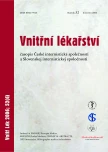-
Medical journals
- Career
Post-transplantation lymphoproliferation in patients with intensive immunosuppression
Authors: H. Vavřinová 1; D. Viklický 1; J. Lácha 1; D. Housa 2; L. Hošková 3; V. Teplan 1
Authors‘ workplace: Klinika nefrologie, Transplantcentrum, IKEM, Praha, přednosta prof. MUDr. Vladimír Teplan, DrSc. 1; Patologicko-anatomické pracoviště, IKEM, Praha, přednostka prim. MUDr. Eva Honsová 2; Klinika kardiologie, IKEM, Praha, přednosta prof. MUDr. Jan Kautzner, CSc., FESC 3
Published in: Vnitř Lék 2006; 52(6): 645-648
Category: Case Reports
Overview
Organ allograft recipients are at higher risk for malignancies development. This risk is known to be different in different types of tumours. Skin cancers and lymphoproliferative disorders have been described to be ones the most frequent (comprising 15-25 % of all malignancies). Here, we present the case of expansive formation localized near the renal allograft in patient, whose native kidneys failed as a consequence of long-term cyclosporine A therapy after orthotopic heart transplantation. The maintenance immunosuppression consisted of combination of cyclosporine A, mycophenolate mofetil and steroids. The expansion offside of transplanted kidney was detected by routine ultrasound examination. After indifferent neurological symptoms, sepsis, and then multiorgan failure occured. Shortly after acute surgery patient died. Autopsy and histopathology showed lymphoproliferative disorder - monomorphic type of posttransplant lymphoproliferative disorder (PTLD). Occurence of PTLD in organ transplantation is discussed.
Key words:
posttransplant malignancies - posttransplant lymphoproliferative disorder (PTLD) - immunosuppression
Sources
1. Boudová L, Fakan F, Michal M et al. Lymfoproliferativní choroba po transplantaci. Čs Patol 2002; 38 : 24-32.
2. Lácha J, Jirka J, Nouza M et al. Nádorová onemocnění po transplantaci ledviny. Čas Lék Česk 1994; 133 : 562-565.
3. Gürlich R, Novotný J, Stříž I et al. Riziko vzniku malignity po orgánové transplantaci. Čas Lék Česk 2005; 144, 597-600.
4. Penn I. The changing pattern of posttransplant malignacies. Transplant Proc 1991; 1 : 1101-1103.
5. Penn I. Cancers complication organ transplantation. N Engl J Med 1990; 323 : 1767.
6. Boubenider S, Hiesse C, Goupy C et al. Incidence and consequences of post-transplant lymphoproliferative disorders. J Nephrol 1997; 10 : 136-145.
7. Jirava D, Fuchsová M, Fanta J et al. Nitrohrudní výskyt potransplantační lymfoproliferace. Rozhl Chir 1999; 78 : 191-195.
8. Ellis D, Jaffe R, Green M et al. EBV - related disorders in children undergoing renal transplantation with tacrolimus based immunosuppression. Transplantation 1999; 68 : 997-1003.
9. Walker RC, Marshall WF, Strickler J et al. Pretransplantation assessment of the risk of lymphoproliferative disorder. Clin Infect Dis 1995; 20 : 1346-1353.
10. Manez R, Breining MC, Linden P et al. PTLD in primary Epstein-Barr virus infection after liver transplantation: the role of CMV disease. J Infect Dis 1997; 176 : 1462-1467.
11. Bierber CP, Heberling RL, Jamieson SW et al. Lymphoma in cardiac transplant recipients associated with cyclosporine A, prednisone and anti-thymocyte globulin (ATG). In: Purtillo DI (ed). Immune deficiency and cancer. New York: Plenum 1984 : 309-320.
12. Swinnen LJ, Costanzo-Norden MR, Fisher SG et al. Increased incidence of lymphoproliferative disorder after immunosuppression with the monoclonal antibody OKT3 in cardiac-transplant recipients. N Engl J Med 1990; 323 : 1723-1728.
13. Guba M, Graeb Ch et al. Pro-and anti-cancer effects of immunosuppressive agents used in organ transplantation. Transplantation 2004; 77 : 1777-1782.
14. European best practise guidelines for renal transplantation. Section IV: Long-term management of transplant recipient. IV.6.1. Cancer risk after renal transplantation. Post - lymphoproliferative disease (PTLD): prevention and treatment. Nephrol Dial Transplant 2002; 17(Suppl 4): 31-3, 35-6.
15. Kauffman HM, Cherikh WS, McBride MA et al. TOR inhibitor maintenance immunossuppression is associated with a reduce incidence of post-transplant malignancies. Transplantation 2004; 78(Suppl 1): 30.
16. Kauffman HM, Cherikh WS, Cheng Z et al. Maintenance Immunossuppression with Target-of-Rapamycin Inhibitors is Associated with a Reduced Incidence of De novo Malignancies. Transplantation 2005; 80 : 883-889.
17. Harris NL et al. Post-transplant lymphoproliferative disorders. In: Jaffe ES. Tumours of haemopoetic and lymphoid tissues. Lyon: IARC Press 2001.
Labels
Diabetology Endocrinology Internal medicine
Article was published inInternal Medicine

2006 Issue 6-
All articles in this issue
- Comparison of plasmatic levels of B-natriuretic peptide with echocardiographic indicators of left ventricle function after doxorubicin therapy
- Obesity and progression of chronic renal insufficiency: a Czech long term prospective double-blind randomised multicentre study
- Molecular genetic diagnostics and screening of hereditary hemochromatosis
- Nuclear receptors PPARα
- Biological treatment of rheumatic diseases
- Chronic renal disease and gravidity – case study
- Post-transplantation lymphoproliferation in patients with intensive immunosuppression
-
Diagnostics and therapy of hepatorenal syndrome.
Recommendations of of the working group on portal hypertension of the Czech Hepatology Society and the J. E. Purkinje Czech Medical Society. - Sustained monomorphic ventricular tachycardia in patients with structural heart disease. Different arrhythmogenic substrates, different options of palliative and curative treatment in the era of three-dimensional mapping
- Prevalence and causes of reflux in deep venous system of the leg in patients with insufficiency of superficial veins
- Trimetazidine in the treatment of stable angina pectoris TRIADA – (TRImetazidine in stable Angina twice Daily)
- Impact of endocannabinoid system in modulation of the metabolic syndrome
-
Ubiquitins, proteasomes, sumoylation and application today and in future for cancer and other diseases therapy II.
Sumoylation and neddylation as posttranslational modifications of proteins and their significance
- Internal Medicine
- Journal archive
- Current issue
- Online only
- About the journal
Most read in this issue- Nuclear receptors PPARα
- Prevalence and causes of reflux in deep venous system of the leg in patients with insufficiency of superficial veins
- Sustained monomorphic ventricular tachycardia in patients with structural heart disease. Different arrhythmogenic substrates, different options of palliative and curative treatment in the era of three-dimensional mapping
- Molecular genetic diagnostics and screening of hereditary hemochromatosis
Login#ADS_BOTTOM_SCRIPTS#Forgotten passwordEnter the email address that you registered with. We will send you instructions on how to set a new password.
- Career

